I FIRST met author and writer Stephen Thompson when we were both living in a rehab for young drug addicts, called Alwyn House, in Notting Hill Gate in 1990, which seems a very long time ago now. This was Notting Hill pre-Richard Curtis when the area was still a reasonably interesting place in which to live. The rehab was a large gently dilapidated five-storey house, with the tang of the institution about it, and situated in a beautiful stucco terrace, off Colville Terrace W11, and facing the building where the precocious pop-starlet Wendy James lived – a fact that generated quite a lot of animation in the male inhabitants of our household.
Stephen was a resident (ie a recovering addict) and I was on the other side, not staff, but a member of the support group, who were a collection of young people, all under 25 years old, as were all members of Alwyn House, and who were in regular employment and could act as sort of role models for the residents. Well, at least that was the idea.
However, Stephen seemed different to the other residents who, even at my callow age, I recognised were the products of extremely neglectful and abusive backgrounds, and, were, in the majority, from very under-privileged families. Middle-class users were cushioned by their family connections and money and didn’t end up in down-at-heel state-funded institutions so early on in their addictions. Residing in Alwyn House was a bargaining chip with the criminal justice system – a way of sidestepping a custodial sentence for someone whose habit, and the attendant need to fund it, had given them cause to appear in front of a judge.
Imposing a relatively unstructured routine on the residents, and not adhering to a 12-step therapeutic framework, or intensive group therapy, Alwyn House had a different character to most rehabs at that time and was, therefore, regarded by the addict community with some suspicion – Alpha House and Phoenix House being the rehabs of choice due to their employing a more macho approach to rehabilitation, admission to Alwyn House was seen as something of a cop-out.
However, I’ve got sidetracked here. I’m sure there’s a PhD, or at the very least a couple of books, to be written on UK rehabs in the late–20th century, but this is neither the time nor the place, and I am hardly up to that task.
Despite my callowness (did I mention that earlier?) I instantly pegged that Stephen was not like the other residents – he just didn’t have that air of heavy duty chemical devotion about him that they did. I strongly intuited that, despite his crack use (hey, Stephen – you were an early adopter!), he just really needed to get away, fast, from a bad situation going down in east London and was looking for a place to lie low in for a while.
And what could be better! An anonymous safe house, a far cry from the boisterous, unglamorous streets of E8. A residence patrolled and policed, however light their touch, by a team of social workers (with questionable degrees of eptitude and experience). There were certainly no brass plaques or signs outside Alwyn House to identify it. Coincidentally, the rehab was around the corner from the house in Powis Square where the Nicolas Roeg/Donald Cammell film, Performance, was set – where another Eastender, Chaz, sat out his exile, under the radar in W11.
But anyway, enough of these ruminations. Stephen and I hit it off instantly. I think we recognised one another’s somewhat distant mien – two people slightly apart from the other inhabitants of Alwyn Houes, and who also shared a predilection for solitude – observers rather than participants.
And after spending some time with Stephen, I discovered that he was trying to make sense of his life on the streets and was writing it down (or out). As I had been participating in a young writers’ workshop led by Hanif Kureishi at the Riverside Arts Centre in Hammersmith, I invited him to accompany me.
Residents’ outings were heavily monitored in the first few months of their stay at Alwyn House (if they managed to clock up even that minimal amount of time – some were out of the door within a day). However, in this instance, the social workers were in favour. Stephen would be in my, a trusted support group member, company, and so apparently, would be carefully supervised and monitored. What could be better! An improving evening class! From those early tentative days, Stephen began writing seriously and, now, 20 years later, three novels and numerous articles published widely in The Observer and Scotland on Sunday, just a couple of examples, Stephen Thompson is an well-established writer.
Coming full circle – it’s Stephen who is living on Ladbroke Grove now, and I’m the one who resides in Hackney, E5, just a few minutes away from the streets he grew up in.
I thought it might be interesting or fun, even, to invite Stephen back to Hackney and accompany him while he revisited his old turf – to find out through his eyes what has changed and what remains the same since he lived here.
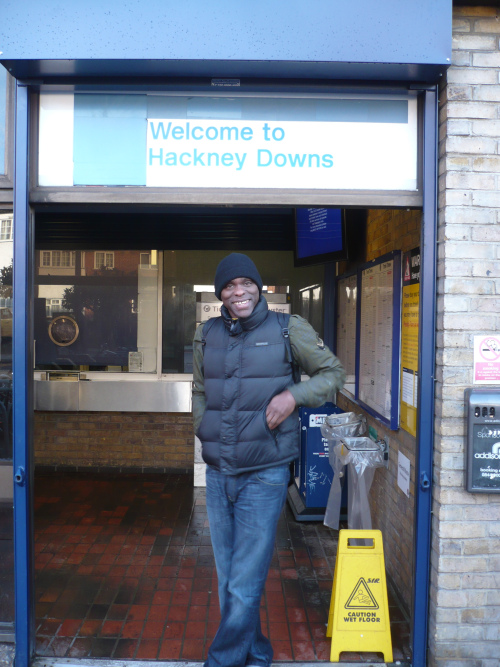
ST: First of all the front line – that block of flats looks quite posh used to be derelict and was where we used to play pool, hang out and take the piss out of the Old Bill. We used to steal sweets from that newsagent I was 15. We would run in, stuff our pockets and run out. The whole row was derelict but the shop is still the same. It’s funny because some things have changed and some things are exactly the same. Of course, there is no one at all around here now, but before, every one of these corners had clumps of people – youths mostly and every five minutes, you’d see the Old Bill, either a van or a car – sometimes both at once patrolling very slowly. This place here used to be a drug den – it was a council house at the time but it was squatted.
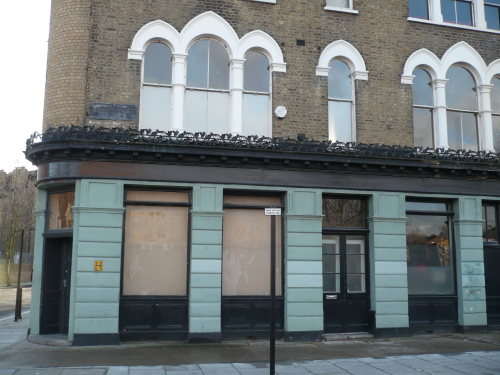
ST: That pub there used to be one of the most notorious in Hackney.
CS: It’s not a pub anymore it’s used as a venue for fashion and film shoots locations.
ST:Classic! It’s no longer a pub! It’s a venue for film shoots that sums it up in one sentence! I think it used to be called the Kingsland Arms or something. That estate over there is called the Cromer Estate which is where I spent most of my childhood. We were known as the Cromer Possee. Another thing I forgot to mention is that there were always cars parked up here pumping music with people smoking weed, shooting the breeze, loafing basically.
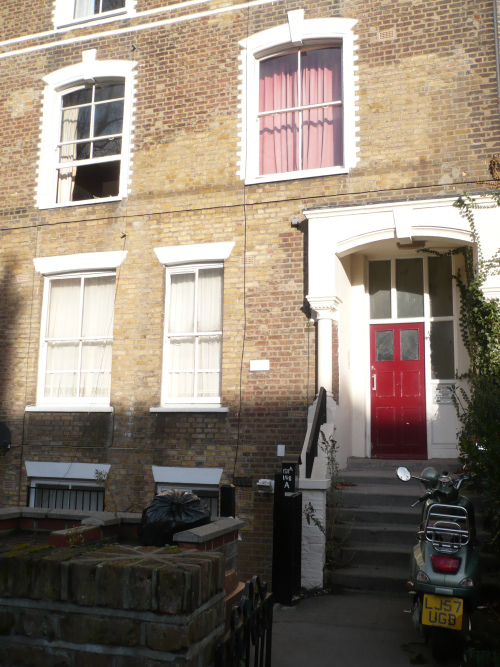
ST:My mum and I were living in Colvestone Crescent, just a few streets away. When they rehoused us, as that place was unfit for human habitation, they moved us to this place, 158 Amhurst Road which is this red door here. The one with the window open was my mum’s flat and I had the one above it. There is a scene in Toy Soldiers which takes place when the central character Gabriel has a freak out after smoking crack. He tries to open the window and jump out but his friend restrains him …
ST:Here we are at Downs Park Estate. This was quite a bad estate. It was known for dealing. The police were always in there. Very poor working class families, mostly black, lived here. I spent a lot of time in there. It looks very quiet now – almost abandoned.
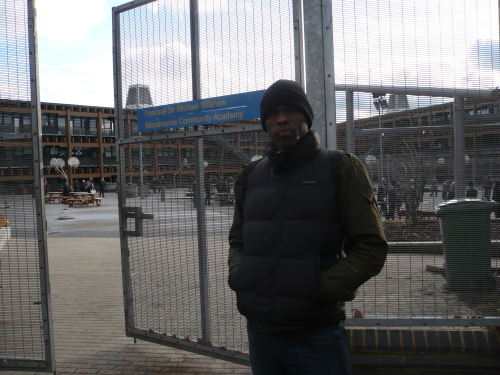
CS: There is your old school coming into view …
ST: Hackney Downs Secondary, now called Mossbourne Community Academy, formerly the Grocers Company which as a grammar school in the 1940s boasted amongst its former alumni Michael Caine and Harold Pinter no less. Of course, when I went there in the late 70s, it had moved on since those days. Truancy was at the highest in the entire country. Sometime in the 90s, it was dubbed the worst school in Britain. It was closed down long after I left, but there it is.
CS:You did your bit!
ST:I made my small contribution to the statistics. But there it is. It’s reopened as the Mossbourne Academy. There is Hackney Downs Park where I spent a lot of time after school playing football and also during school hours dreaming of going over there to play football. As soon as the bell had gone, we were out of the gates and into the park. It looks now like a gated school like you see in The Wire. The funny thing is the same basic structure has been kept – the playgrounds were always at the back. It just looks brighter. Before it was just a grey slab with the train lines running next to it which we used to hate.
CS:Because it was noisy?
ST:No, because it seemed to encroach on the space. We would much rather have been able to go over that side of the wall but we couldn’t – “be careful of the trains”. It was always high fences and stuff. There were a few near misses as people ignored that rule.
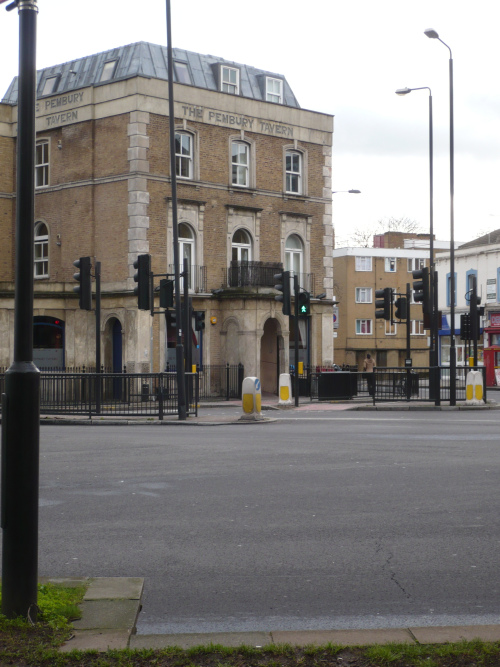
ST:There’s the Pembury Tavern. I don’t know what kind of pub it is now, but in the early 1980s it used to be full of East End villains.
CS:Just white people?
ST:Yes, it was a no-go zone. If black people went there, it was because they had been incorporated into a villain family – they would be Cockney black guys.
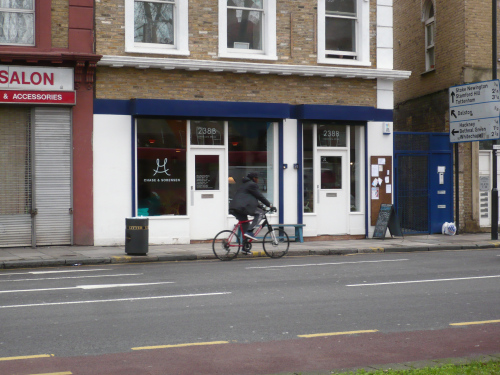
ST:Number 238b was Ozzy’s – as you can see it’s changed now – it was where we used to hang out, kill time, smoke weed, play pool and arcade games like Space Invaders.
CS:It’s a posh Scandinavian cafe now.
ST:Ozzy”s now a posh Scandinavian cafe! I can’t believe it! Chase and Sorenson.
That is the biggest change I’ve encountered today.
Our walk now progresses along Clarence Road, the location of the most sustained of last August’s riots that took place in Hackney.
We pass two men hanging out by the end of the street, at the junction of Dalston Lane.
CS:
I recognise those two guys. I left Hackney in 1989, think how long ago that was 23 years ago! I recognise them but they didn’t recognise me! They are still here.
We walk towards Pogo, a vegan cafe on Clarence Road. You can see why they say Hackney is now trendy.
CS:I don’t think they are very trendy there. Pogo is more full of crusties.
ST:Pembury Estate has not changed very much. It’s just got more satellite dishes!
It’s bit prison-like with all those grills.
We reach my flat and our walk concludes.
Caroline’s interview with Stephen Thompson:
CS:What would you say are the high points and low points of your writing career?
ST:The high point was getting Toy Soldiers published in 2000 and it being so widely publicised and widely reviewed. Although I have some regrets about how I conducted myself during that time.
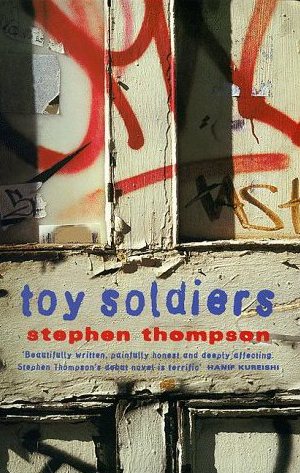
ST:When you are getting a lot of publicity for your first novel you are prepared to do and say almost anything. I regret a lot of the imagery that was used to publicise myself as an author.
CS:Like what?
ST:Almost every photo portrayed me as a thug from Hackney.
CS:Ghetto?
ST:Exactly. I wanted to smile more (I would later satirise this in a novel). Photographers would say “no smiling, no smiling”. They wanted me to look serious and I think I should have been a bit more determined to make a distinction between my life and the book, which was a heavily fictionalised account of my own experiences. I didn’t do myself any favours. I didn’t promote myself enough as a creative writer and that is a regret. But overall the book coming out was a high point. The low point was when my follow-up fell into the world still-born. The publishers did nothing to promote it.
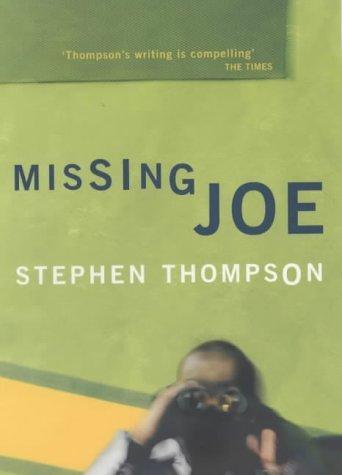
CS:Missing Joe?
ST:It was almost the opposite of Toy Soldiers in terms of review and publicity. I’ll never forget the night Courttia Newland and I drove around in my car with posters I had printed up at my own expense, putting them up around Ladbroke Grove so that people would be aware of the book.
CS:Why didn’t the publishers push that book?
ST:I don’t know, exactly. It did get reviewed. I also did radio interviews. However, there were no big features on me or the book. And the sales were disappointing. If I’m perfectly honest, and this isn’t easy to prove, I think it failed to get attention because it wasn’t as incendiary as Toy Soldiers in terms of the storyline, I would consider it to be much more a work of literature, much more a work of imagination, although it deals with my parents and my parents’ generation. Toy Soldiers has a lot of drugs and crime set in the black community, which, let’s face it, is more interesting to the media.
CS:I really liked Missing Joe. I thought it was ambitious and I thought it was good that you got out of the comfort zone – the stereotype zone of guns, crime and crack. What inspired this ambitious move?
ST:As you just mentioned, I wanted to get out of my comfort zone and prove myself to be a diverse writer. I wanted to move away from myself and talk about my parents. If Toy Soldiers is about me and my generation, Missing Joe is about the so-called Windrush generation. I didn’t know very much about that group of people and I wanted to see if I could examine them through fiction.
CS:I liked the book’s menacing sense of what happens in small town England,
those nasty spiteful crimes that no one talks about – and people get away with.
ST:That’s what my publisher said to me as well.
CS:They (the books) came out quite consecutively.
ST:I had a very embryonic version of Toy Soldiers when I was at rehab in 1990. I really began it in 1991, when I had left. Then I worked on it off and on for 10 years. Once she had placed it, my agent managed to secure a two-book deal in 1999 so I had to write another one. Thus the pressure was on. I had a bit of money left from my advance and I went to Thailand to celebrate and think about the book. After that, I went to Jamaica to spend some time with my mum. It was while I was there that I started to think about Missing Joe.
I started making notes there in 1999 and more-or-less as soon as Toy Soldiers came out. I knew what the next book was going to be, although I hadn’t told my agent or publisher. I moved to Paris in the summer of 2000 to begin work on it. I initially went there for six months but I ended up staying there for three years.
It didn’t take me that long to write Missing Joe. It’s actually a shorter book than Toy Soldiers. And about a third of the story had to be grafted on. My original manuscript was more like a novella.
My publisher said it was really good but it was too small and that I had to make it longer. It was the first time I came up against this notion of writing to length as a novelist, how commercial considerations come into novel writing. For instance, if you are going to buy a novel for £10, you clearly want value for money. Only the very, very successful authors can get away with publishing something short for that kind of money. However, I wasn’t in that category, so I had to make my story much longer. That’s how I came up with setting part of the story in Jamaica. I spent five years of my childhood growing up in rural Jamaica, so most of that section of the book was done from memory.
CS:I think it is very successful. I love the sense of mystery and menace
ST:I wanted it to be a page turner as well. In retrospect, there are a number of things I was trying to pull off in that book. I wanted to write about my parents. I wanted to write about their lives in London and in Jamaica. I wanted to write something “literary” but also a gripping page turner, a psychological thriller, for want of a less clichéd definition.
CS:So we turn to your next book Meet Me Under the Westway.
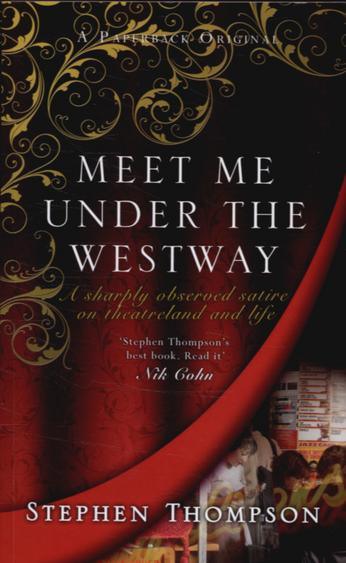
ST:It came out a full six years after Missing Joe. Actually, this puts me in mind of your earlier question about what was the low point of my career. That was probably after I had published Missing Joe and it hadn’t done very well. I went from that to losing my agent and also being out of contract. So that was a deeply insecure and worrying time. Because I was almost back to square one.
They always say you are only as good as your last book. So I felt really under pressure to write something very quickly. Again, I wanted to write something different, which ended up being Meet Me Under the Westway. I wanted to go back to my experiences but I wanted them to reflect the new me, if you like. I wanted to write about my time in Notting Hill, when I joined the Royal Court Young People’s Theatre and was exposed to a different world to the one I’d been used to, namely, a white middle class theatre set.
Meet Me Under the Westway isn’t a so-called black book, in fact it’s non-colour specific. It’s not clear what race the narrator is. Again, I was deliberately trying not to get pigeonholed into being a so-called black writer. The upshot was that my agent at Curtis Brown turned it down – which was a shock to the system.
CS:Did she give you a reason?
ST:Yes, she said that it wasn’t a patch on Missing Joe and that she was sorry to say that she just didn’t like it. She thought I could do a lot better. Which was not just a shock to the system but to the ego. This was a time when I had started to think I could do no wrong, that whatever I wrote would be published. If you don’t have an agent in this business, you can’t get your manuscript in front of a publisher, even though I had a good relationship with my publisher. I scrambled around trying to find a new agent without success. In the end I bit the bullet and took the book to the publisher myself. When she turned it down, my world collapsed. It felt like my career was over before it had even started.
So, that was the lowest point. That manuscript of Meet Me Under The Westway ended up being put in a drawer. I finished it in 2002. I left Paris in 2003. My girlfriend and I split up. It was a worrying time. I went to Thailand, where I always seem to end up when I have to lick my wounds, and stayed there for five months. This time I thought I need to write something else to get back in the game.
While I was there, I recklessly started work on another novel, this time about the slave revolts 19th century Jamaica. It was hard-going. In fact, before I went to Thailand, I went to Jamaica to do my research. I spent a lot of time with my family. I was very excited by the project, although as things turned out, the actual writing was very taxing. I think writing should be enjoyable, but this wasn’t. This was more like drudge. Now when I look at that manuscript, I see terrific passages of prose, but it’s only there in patches. Anyhow, I now had two manuscripts on my hands.
CS:What was that one?
ST:It’s called Rebellion, and it’s thematically inspired by Camus’ The Rebel.
CS:… and you haven’t published that?
ST:Not yet.
CS:And how did you get Meet Me Under the Westway published?
ST:When I came back from Thailand I moved to Edinburgh, where I met a woman who was starting up a literary imprint called Chroma, specialising in contemporary fiction. I told her I had something she might be interested in. And as soon as she read it, she said she would take it. But then I was faced with more difficulties. The book was going to published by a small press, and one that was based in Edinburgh. The publisher was confident about the Scottish market, but how to make inroads into the southern market? How do we get the book out in London? It was very, very difficult. It’s very difficult for Scottish writers full-stop to get a look in down south.
CS:Even after Irvine Welsh?
ST:Even after Irvine Welsh. But we did our best. I managed to get some copies sold down here. The Waterstones in Notting Hill Gate did a massive window display and we sold quite a few.
CS:It’s a great title.
ST:Thanks. I had a sense of vindication after that book came out because I thought it was never going to see the light of day and that really knocked my confidence. So for someone to see something in it, and to want to pay money for it gave me a real shot in the arm. It was published and people bought it. Then I tried to get Rebellion placed but couldn’t and my confidence took another knock. My agent that I found in Edinburgh just couldn’t place it with anyone. So I had to draw a line under that. So all in all, it was a very troubling period between 2001 when Missing Joe came out and 2007 when Meet Me Under the Westway was published.
ST:
After that, I started doubting myself as a writer. I didn’t know if I wanted to continue and if I did, what sort of things I wanted to write about and whether anyone would be interested. I had the feeling that I was being subtly pushed in the direction of writing about the black urban experience, whatever that is, and I just didn’t want to do it, or at least not exclusively. It was far too limiting. At the same time, I wanted to be published. There was a tension there, and I don’t think I’ve resolved it yet. Perhaps I never will.
CS:So what were you doing at the Royal Court?
ST:I was writing for the stage. I wanted to see it I could do it.
CS:You weren’t acting?
ST:No. There were two groups, an acting workshop and a writing workshop,
and at the end of each term we would do a joint production.
Writers would write and actors would act. But for most part, the two groups were separate.
I liked it because you met up once a week. There was a tutor who would facilitate readings.
We would write our pieces during the week and present them to be critiqued. I enjoyed it
because for the first time since I was in rehab, I was in the company of other budding
writers. Do you remember when you and I used to go to Hanif’s class?
CS:Yes.
ST:It was a similar vibe. I met a bunch of really lovely
young people at the Royal Court Young People’s Theatre and a couple of them, Joe Penhall
and Nick Grosso went on to become famous playwrights. You could tell that there was a
handful of us who were really ambitious, who wanted to succeed. But I quickly realised
that writing for the stage wasn’t for me. That’s much more of a collaborative process.
“I want to be a writer with longevity”
CS:You are more reflective aren’t you?
ST:(Laughs) Playwriting is reflective, too.
No, what I mean is, I’m more of a loner. It’s funny because my group used to tease me
a lot because if I got any bad criticism for my theatre pieces,
I would always say, “I don’t really want to write for the stage anyway. I’m a novelist.
I’m working on my novel right now”. It’s true. I was working on Toy Soldiers the entire time.
CS:So where do you see your writing progressing?
ST:In 2008, after Meet Me Under the Westway came out, I started thinking about writing as a profession. It’s ironic, actually, as this predates the current debate that writers are having in the wake of the ebook revolution and the notion of free-content. I was thinking about it from the point of view of being able to make a living, but also whether I wanted to explore other forms of writing. I enjoy other forms of writing. I like writing my diary, I like writing short stories. The only thing I don’t write is poems. I’ve always written screenplays.
So in 2008, I decided I wanted to try to get into film, writing them and directing them. Someone at the time advised to enrol in a film school, but I didn’t want to become influenced by film theory. I wanted to learn the craft of film making by actually doing it, just as I learned to write novels by getting on with it. Not long after making my decision to start making films, I wrote a short, which was filmed and then I directed another short. I loved it. Actually, I say I’ve never studied film. That’s not quite true. Like Tarantino, I worked in a video store for years, which has helped my understanding of film enormously.
CS:When did you do that?
ST:In Edinburgh, off and on for about five years. I regard that as my film school. It fuelled my appetite for film making. And not only for fictionalised stories. I am working on a documentary at the moment.
CS:What’s that about?
ST:Not so long ago I got a call from a friend saying, “Stephen I’ve just got hold of a book about the black power movement in London during the 1970s, which I think would make a great film”. The book is called The book is called Black for a Cause … Not Just Because and was written by Winston N Trew who was one of a group of four men who were arrested in 1972 at the Oval tube station in south London who were sent to prison for crimes they didn’t commit. Their case became quite famous as a miscarriage of justice. My friend thought the book would make a great TV drama, but when I read it I thought it would work better as documentary and so I set to work right away trying to conceive it my mind’s eye.
I am very excited about this project and about film making in general. I used to see myself as a novelist and now I see myself as a storyteller who is prepared to explore other forms of storytelling besides the written word. But don’t get me wrong, writing remains a passion of mine, it’s just that I no longer limit myself to writing novels. I like writing journalism for instance. I write essays, too. I like writing them too. In fact, I am going to have a piece published by Five Dials in a couple of months’ time about Marcus Garvey.
CS:Yes, you are a very good journalist.
Why do you think you like writing so much?
ST:That’s a very good question! If I go way back to when I was a child,
the one thing I was always good at school at was English – both written and spoken.
I was always told I had a facility for the English language.
And when I was at rehab, I thought this is my strength, I am not really good at anything
else. How can I make this work for me, which is why I thought I would become a journalist and earn a bit of money. How naive was I!
And as you know I stumbled into writing fiction. If Hanif hadn’t encouraged me, I might never have continued.
CS:What did he say, exactly? I remember he was very tight with the compliments..
ST:You can say that again. Anyway, he told me I had it in me to become some kind of writer.
CS:I guess there’s a compliment in there somewhere.
ST:(Laughs) I guess.
CS:Why did your mother send you to live in Jamaica?
ST:For economic reasons.
She was a single mum with four boys and one girl. I went to live with my grandmother in
a very rural part of Jamaica for five years, between the ages of five and ten.
It was just me, my gran and my imagination. The emotional and psychological effect is one thing,
but it’s great preparation for a life of solitude. I was recently discussing childhood
experiences and how we repeat them in adulthood and it occurred to me that the reason
I go off to far-flung parts of the world for long periods of time is because that’s what
I did as a child, albeit against my will. The point is that I still live a life of
solitude, I am quite a solitary figure, so for that reason I’m grateful for that early
childhood experience. It prepared me for the life of a writer, which is essentially
one of solitude.
“I see myself as a storyteller who wants to explore other forms of storytelling”
CS:Are you an avid reader?
ST:Yes. I think it’s because I came to literature quite late.
When I was growing up, there were no books in my house. Apart from the odd book we
studied at school, such as Kes, books weren’t part of our existence. I only started
reading books at rehab. I remember the very first novel that really made an impression
on me was Love in the Time of Cholera, which I got out at our local library in Ladbroke
Grove. And the other one was Rushdie’s Midnight’s Children. I don’t know if you remember
a guy called Riz, an Asian guy who was at the rehab?
CS:I think that was after I had left.
ST:Riz had all of Rushdie’s novels at that time.
CS:Was he in the support group or a resident?
ST:He was a resident. He handed me Midnight’s Children
one day and said, “Stephen you’ve got to read this”. And then I just started reading
everything. And I thought, “Bloody hell, where have I been?” I felt quite resentful that
I had never really been exposed to literature. Having said that, I realise that if I had
done, I probably would have rejected it, since my childhood was about rejecting everything
that I was forced to do, whether it be studying at school or going to church on a Sunday.
I am glad I came to books of my own volition.
CS:Sometimes you have to live first, don’t you?
ST:Yes. Now I don’t read as much as before,
as voraciously I mean. These days I am much more discriminating.
CS:Are there any contemporary writers you like?
ST:I don’t read a lot of fiction these days.
Someone told me that once you get past a certain age, you don’t read much fiction as
you are always looking for an experience which is much closer to the truth, closer to the
source, you want to hear directly from a writer what they think or feel.
You don’t want it mediated through the artifice of fiction.
But I do read the odd fictional work. I like Rupert Thomson who is one of this country’s
best imaginative prose writers. I like Chimamanda Ngozi Adichie. I thought
Half of a Yellow Sun, her follow−up to Purple Hibiscus, was terrific. I reviewed it for
Scotland on Sunday. I thought it was great how she went from having potential in one book
to realising it in the other because often it can go the other way. Some writers arrive
in a blaze of glory and they can’t live up to it. I think it’s always better to be
a bit of a slow burn. She’s definitely done that – a very talented writer.
I really like Luke Sutherland, his Venus as a Boy is one of the best things I’ve ever read.
There are other novelists out there who I admire, but the truth is you’re much more likely
to find me with my nose between the pages of a non-fiction book. I’m heavily into history
at the moment. Perhaps at a certain point in your life, you start looking back.
I like African, Caribbean and African-American history. This all started when I began
researching my historical novel, Rebellion, and I’ve kept it up. And I like anything
that’s to do with human consciousness, how we raise our consciousness, which can be
anything from Mandela’s Long Walk to Freedom to a Life of Buddha.
by Caroline Simpson